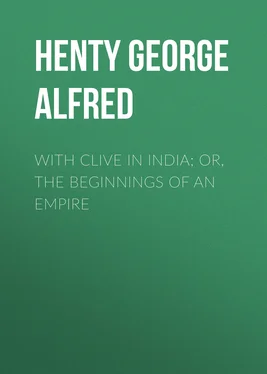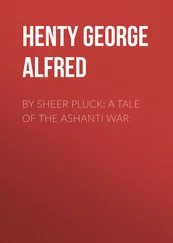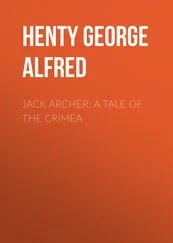George Henty - With Clive in India; Or, The Beginnings of an Empire
Здесь есть возможность читать онлайн «George Henty - With Clive in India; Or, The Beginnings of an Empire» — ознакомительный отрывок электронной книги совершенно бесплатно, а после прочтения отрывка купить полную версию. В некоторых случаях можно слушать аудио, скачать через торрент в формате fb2 и присутствует краткое содержание. Жанр: foreign_children, foreign_antique, foreign_prose, prose_military, на английском языке. Описание произведения, (предисловие) а так же отзывы посетителей доступны на портале библиотеки ЛибКат.
- Название:With Clive in India; Or, The Beginnings of an Empire
- Автор:
- Жанр:
- Год:неизвестен
- ISBN:нет данных
- Рейтинг книги:5 / 5. Голосов: 1
-
Избранное:Добавить в избранное
- Отзывы:
-
Ваша оценка:
- 100
- 1
- 2
- 3
- 4
- 5
With Clive in India; Or, The Beginnings of an Empire: краткое содержание, описание и аннотация
Предлагаем к чтению аннотацию, описание, краткое содержание или предисловие (зависит от того, что написал сам автор книги «With Clive in India; Or, The Beginnings of an Empire»). Если вы не нашли необходимую информацию о книге — напишите в комментариях, мы постараемся отыскать её.
With Clive in India; Or, The Beginnings of an Empire — читать онлайн ознакомительный отрывок
Ниже представлен текст книги, разбитый по страницам. Система сохранения места последней прочитанной страницы, позволяет с удобством читать онлайн бесплатно книгу «With Clive in India; Or, The Beginnings of an Empire», без необходимости каждый раз заново искать на чём Вы остановились. Поставьте закладку, и сможете в любой момент перейти на страницу, на которой закончили чтение.
Интервал:
Закладка:
"There was nothing to be frightened at, Tim," Charlie said. "It was a snake charmer. I have never seen one yet, but there are numbers of them all over India. Those were not ears you saw, but the hood. The snakes like the music, and wave their heads about in time to it. I believe that, although they are a very poisonous snake and their bite is certain death, there is no need to be afraid of them, as the charmers draw out their poison fangs when they catch them."
"Do they, now?" Tim said, in admiration. "I wonder what the regimental barber would say to a job like that, now. He well nigh broke Dan Sullivan's jaw, yesterday, in getting out a big tooth; and then swore at the poor boy, for having such a powerful strong jaw. I should like to see his face, if he was asked to pull out a tooth from one of them dancing sarpents.
"I brought ye in some fruits, yer honors. I don't know what they are, but you may trust me, they're not poison. I stopped for half an hour beside the stall, till I saw some of the people of the country buying and ating them. So then I judged that they were safe for yer honors."
"Now, Tim, you'd better go and lie down and get a sleep, if the spiders will let you, for you will have to be under arms all night, as it is possible that we may be attacked."
The first part of the night passed quietly. Double sentries were placed at each of the angles of the walls. The cannons were loaded, and all ready for instant action. Doctor Rae and his two subalterns were upon the alert, visiting the posts every quarter of an hour to see that the men were vigilant.
Towards two o'clock a dull sound was heard and, although nothing could be seen, the men were at once called to arms, and took up the posts to which they had already been told off on the walls. The noise continued. It was slight and confused, but the natives are so quiet in their movements, that the doctor did not doubt that a considerable body of men were surrounding the place, and that he was about to be attacked.
Presently one of the sentries over the gateway perceived something approaching. He challenged, and immediately afterwards fired. The sound of his gun seemed to serve as the signal for an assault, and a large body of men rushed forward at the gate, while at two other points a force ran up to the foot of the walls, and endeavoured to plant ladders.
The garrison at once collected at the points of attack, a few sentries only being left at intervals on the wall, to give notice should any attempt be made elsewhere. From the walls, a heavy fire of musketry was poured upon the masses below; while from the windows of all the houses around, answering flashes of fire shot out, a rain of bullets being directed at the battlements. Doctor Rae himself commanded at the gate; one of the subalterns at each of the other points assailed.
The enemy fought with great determination. Several times the ladders were planted and the men swarmed up them, but as often these were hurled back upon the crowd below. At the gate the assailants endeavoured to hew their way, with axes, through it; but so steady was the fire directed, from the loopholes which commanded it, upon those so engaged, that they were, each time, forced to recoil with great slaughter. It was not until nearly daybreak that the attack ceased, and the assailants, finding that they could not carry the place by a coup de main, fell back.
The next day, the main body of the British force returned with the convoy. News arrived, the following day, that the enemy were approaching to lay siege to the place.
The news of the capture of Arcot had produced the effect which Clive had anticipated from it. It alarmed and irritated the besiegers of Trichinopoli, and inspired the besieged with hope and exultation. The Mahratta chief of Gutti and the Rajah of Mysore, with whom Muhammud Ali had for some time been negotiating, at once declared in his favour. The Rajah of Tanjore and the chief of Pudicota, adjoining that state, who had hitherto remained strictly neutral, now threw in their fortunes with the English, and thereby secured the communications between Trichinopoli and the coast.
Chunda Sahib determined to lose not a moment in recovering Arcot, knowing that its recapture would at once cool the ardour of the new native allies of the English; and that, with its capture, the last hope of the besieged in Trichinopoli would be at an end. Continuing the siege, he despatched three thousand of his best troops, with a hundred and fifty Frenchmen, to reinforce the two thousand men already near Arcot, under the command of his son Riza Sahib. Thus the force about to attack Arcot amounted to five thousand men; while the garrison under Clive's orders had, by the losses in the defence of the fort, by fever and disease, been reduced to one hundred and twenty Europeans, and two hundred Sepoys; while four out of the eight officers were hors de combat.
The fort which this handful of men had to defend was in no way capable of offering a prolonged resistance. Its walls were more than a mile in circumference, and were in a very bad state of repair. The rampart was narrow and the parapet low, and the ditch, in many places, dry. The fort had two gates. These were in towers standing beyond the ditch, and connected with the interior by a causeway across it. The houses in the town in many places came close up to the walls, and from their roofs the ramparts of the forts were commanded.
On the 23rd September Riza Sahib, with his army, took up his position before Arcot. Their guns had not, however, arrived, with the exception of four mortars; but they at once occupied all the houses near the fort, and from the walls and upper windows kept up a heavy fire on the besieged.
Clive determined to make an effort, at once, to drive them from this position, and he accordingly, on the same afternoon, made a sortie. So deadly a fire, however, was poured into the troops as they advanced, that they were unable to make any way, and were forced to retreat into the fort again, after suffering heavy loss.
On the night of the 24th, Charlie Marryat, with twenty men carrying powder, was lowered from the walls; and an attempt was made to blow up the houses nearest to them; but little damage was done, for the enemy were on the alert, and they were unable to place the powder in effective positions, and with a loss of ten of their number the survivors with difficulty regained the fort.
For the next three weeks the position remained unchanged. So heavy was the fire which the enemy, from their commanding position, maintained, that no one could show his head for a moment, without running the risk of being shot. Only a few sentinels were kept upon the walls, to prevent the risk of surprise, and these had to remain stooping below the parapet. Every day added to the losses.
Captain Clive had a series of wonderful escapes, and indeed the men began to regard him with a sort of superstitious reverence, believing that he had a charmed life. One of his three remaining officers, seeing an enemy taking deliberate aim at him through a window, endeavoured to pull him aside. The native changed his aim, and the officer fell dead. On three other occasions sergeants, who accompanied him on his rounds, were shot dead by his side. Yet no ball touched him.
Provisions had been stored in the fort, before the commencement of the siege, sufficient for sixty days; and of this a third was already exhausted when, on the 14th of October, the French troops serving with Riza Sahib received two eighteen-pounders, and seven smaller pieces of artillery. Hitherto the besiegers had contented themselves with harassing the garrison night and day, abstaining from any attack which would cost them lives, until the arrival of their guns. Upon receiving these, they at once placed them in a battery which they had prepared on the northwest of the fort, and opened fire.
Читать дальшеИнтервал:
Закладка:
Похожие книги на «With Clive in India; Or, The Beginnings of an Empire»
Представляем Вашему вниманию похожие книги на «With Clive in India; Or, The Beginnings of an Empire» списком для выбора. Мы отобрали схожую по названию и смыслу литературу в надежде предоставить читателям больше вариантов отыскать новые, интересные, ещё непрочитанные произведения.
Обсуждение, отзывы о книге «With Clive in India; Or, The Beginnings of an Empire» и просто собственные мнения читателей. Оставьте ваши комментарии, напишите, что Вы думаете о произведении, его смысле или главных героях. Укажите что конкретно понравилось, а что нет, и почему Вы так считаете.












